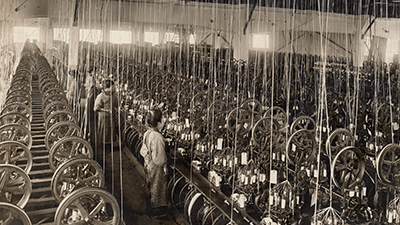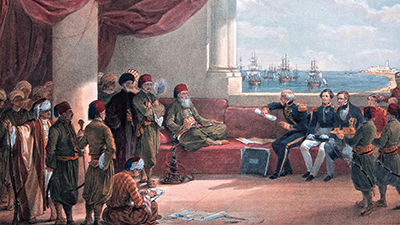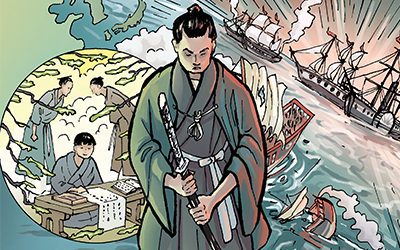Industrialization: Government’s Role from 1750 to 1900 CE
Teacher Resources
Driving Question: How did the economic strategies of different states and empires shape their development and impact the world?
While the Industrial Revolution started in the late eighteenth century, not all societies industrialized at once. All around the world, different factors, such as access to resources and colonialism, helped some societies to industrialize faster and more efficiently than others. In this lesson, you will compare two societies that began the process of industrialization in the late nineteenth century.
Learning Objective
- Assess the scale of the Industrial Revolution and its impact on various regions of the world.
- Explain the causes and effects of the economic strategies of different states and empires.
Vocab Terms:
- debt
- deindustrialization
- export
- Industrial Revolution
- manufacturing
- reform
- tariff
Opener: Industrialization: Government’s Role
To teach this lesson step, refer to page 2 of the Lesson 5.6 Teaching Guide.
Historical causation is key to understanding how the past has unfolded. Read more in our Causation One-Pager.
Think industrialization was all booming factories and happy workers? Think again.
Meiji Restoration: Japan’s Industrial Revolution
To teach this lesson step, refer to page 3 of the Lesson 5.6 Teaching Guide.
How did Japan develop into a major world power over the course of 25 years? The answer partially lies with American warships.
-
Guiding Questions
-
Before you read
Before you read, you should quickly skim the article, by looking at the headings of each section and the charts. Read the questions below as well, so you know what to look for when you read!
While you read
Look for answers to these questions:
- Why was the arrival of American warships such a shock to the Japanese? What domestic problems did Matthew Perry’s arrival worsen?
- The Tokugawa Shogunate had kept the emperor as a figurehead and religious symbol. This article is titled the “Meiji Restoration,” did the restoration actually place the emperor back into power? Use evidence from the article to explain your reasoning.
- After the restoration, the emperor put many samurai into government and into positions of power. But how was this different from the previous political system?
- What steps did the reformers take to modernize Japan?
- Why was Japan’s victory over Russia so important?
After you read
Respond to the following questions:
- Describe the extent to which this article explains the causes and effects of economic strategies of different states and empires.
- The Meiji Restoration made possible a huge economic transformation in Japan and East Asia. It made Japan an economic power on par with many European nations. What effect did this change have on Japanese society?
- Think back to earlier in this unit, when we examined all kinds of political revolutions. The Meiji Restoration revolutionized Japan, but was it a political revolution? Compare and contrast the Meiji Restoration and a political revolution you learned about earlier in this unit.
Muhammad Ali: Egypt’s Industrial Revolution
To teach this lesson step, refer to page 4 of the Lesson 5.6 Teaching Guide.
Egypt had cotton and the beginnings of an industrialized economy. So why did their industrialization fail?
-
Guiding Questions
-
Before you read
Before you read, you should quickly skim the article, by looking at the headings of each section and the charts. Read the questions below as well, so you know what to look for when you read!
While you read
Look for answers to these questions:
- Who was Muhammad Ali, and how did he try to industrialize Egypt?
- How did the economic changes described in the article affect the lives and labor practices of Egyptian peasants?
- What were the three main reasons industrialization failed in Egypt?
- How did Egypt’s economic decline reshape ideas about industrialization and modernization? What were some of the solutions Egyptian scholars and leaders proposed for modernizing Egypt more effectively?
- What role did foreign powers play in the aftermath of Egypt’s industrial collapse? How did these global forces impact Egyptian society?
After you read
Respond to the following questions:
- Describe the extent to which this article explains the causes and effects of economic strategies of different states and empires. How do economic strategies in Egypt compare to those of Japan?
- How did industrialization transform society and labor practices in nineteenth-century Egypt?
- According to the author of this article, “Egypt’s industrialization and actual independence had both been ended by 1882.” How would you compare Egypt’s experience to that of Japan?
Graphic Biography: Iwasaki Yatarō
To teach this lesson step, refer to page 5 of the Lesson 5.6 Teaching Guide.
The Three Step Reading for Graphic Biographies: Tool is a great resource for helping students dig into this genre.
Have you ever heard of a rags to riches story? Someone works their way from a lower economic rung to a higher economic position. In the example of Iwasaki Yatarō, an ordinary samurai went on to become the head of one of the largest corporations on Earth.
-
Guiding Questions
-
Before you read
Skim the full comic, paying attention to things like prominent colors, shapes, and types of text and fonts. How do you know where to start and which direction to read? What’s in the gutters (the space between panels)? Who is the focus of the comic? What big questions do you have?
While you read
Look for answers to these questions:
- What were Iwasaki Yatarō‘s origins?
- Why did many in Japan want to industrialize in the late nineteenth century?
- What did Iwasaki Yatarō himself do, and how was he regarded by people in Nagasaki?
- What do you think is the meaning of the quote from Isawaki’s biographer?
- How does the artist represent changes in both Japan and Isawaki using art in this biography?
After you read
Respond to the following question:
- How does this biography of Iwasaki Yatarō support, extend, or challenge what you have learned about industrialization in Japan? Or the impact of industrialization on people and societies more generally?
Closer: Industrialization: Government’s Role
To teach this lesson step, refer to page 6 of the Lesson 5.6 Teaching Guide.
Need to cover the important skill of historical comparison but feeling a little pressed for time? Read more on Comparison of Egypt & Japan in the Community Forum.
Although industrialization affected many countries at approximately the same time, the way it affected those countries varied. You will examine Egypt and Japan to analyze the different ways industrialization affected nations.






